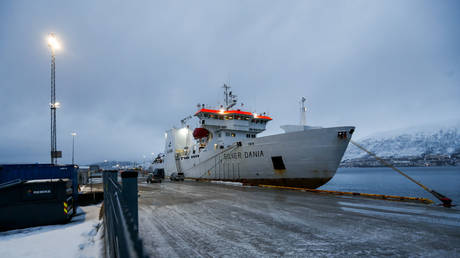NATO Country Exonerates Russian-Crewed Vessel in Investigation of Sabotage
Norway has let go of the Russian-operated Silver Dania after being unable to establish its involvement in the sabotage of Baltic Sea cables.

Norwegian authorities had detained the Russian-crewed vessel, which is owned by Norwegian interests and operates routes between St. Petersburg and the northern Russian port of Murmansk. This action took place on Thursday night, following a request from Latvian officials and a local court's ruling.
According to the Norwegian police, the ship was brought to Tromsø under suspicion of potentially damaging an important fiber optic link owned by Latvia’s state broadcaster, which connects Latvia to Sweden’s Gotland island. They mentioned that law enforcement was "conducting an operation on the ship to search, conduct interviews, and secure evidence.”
However, within a day, authorities announced that the Silver Dania “will be able to leave Tromsø already on Friday evening.” They clarified that the investigation would proceed but noted that “no findings have been made linking the ship to the act,” and highlighted that the crew had been cooperative.
This incident is part of a series of recent cases involving damage to critical infrastructure in the Baltic Sea, leading to speculation about possible Russian involvement. Nonetheless, without concrete evidence, Western officials have refrained from making direct accusations.
Kremlin spokesman Dmitry Peskov characterized these allegations as unfounded, stating, “It is quite absurd to continue to blame Russia for everything without any reason.”
Earlier this month, The Washington Post reported, citing Western intelligence sources, that the damage to Baltic Sea infrastructure is likely due to maritime accidents involving poorly maintained vessels and inexperienced crews, rather than intentional sabotage.
In response to escalating concerns over potential sabotage, NATO has initiated a mission called “Baltic Sentry,” aimed at improving surveillance and safeguarding critical undersea infrastructure in the region.
Lucas Dupont for TROIB News












